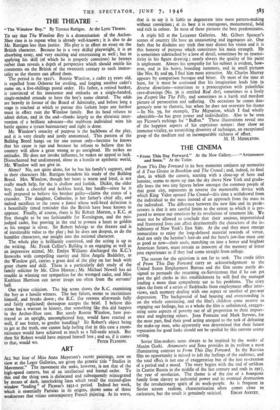THE CINEMA
"From This Day Forward." At the New Gallery.—" Artamonov. and Sons." At the Tatler.
From This Day Forward in its best moments conjures up memories of A Tree Grows in Brooklyn and The Crowd ; and, indeed, its final shot, in which the camera, starting with a close-up of hero and heroine, seems to move up into the sky above New York and gradu- ally loses the two tiny figures below amongst the common people of that great city, represents in reverse the memorable device with which King Vidor opened The Crowd—this time a withdrawal from the individual to the mass instead of an approach from the mass to the individual. The difference between the new film and its prede- cessors is that it sets careful limits to the extent to which it is pre- pared to arouse our emotions by its revelations of tenement life. We must not be allowed to conclude that their anxious, impoverished and frustrated lives can affect detrimentally the characters of the in- habitants of New York's East Side. At the end they must emerge immaculate to enjoy the long-delayed material rewards of virtue. And not only the heroine's hair-do and the hero's jaw-line must stay as good as new—their souls, marching on into a better and brighter American future, must remain as innocent of the memory of bitter past experiences as if they had come straight from college.
The reason for the optimism is not far to seek. The credit titles of From This Day Forward carry an acknowledgement to the United States Employment Bureau and the film seems partly de- signed to persuade the returning ex-Serviceman that if he can get past the girl clerks in this establishment he will find the manager lending a more than sympathetic ear to his problems. The story takes the form of a series of flashbacks from employment office inter- views, each memory dealing with one aspect or another of pre-war depression. The background of bad housing and overcrowding is on the whole convincing, and the film's children come nearest to engaging our feelings, but as a whole the film is unbalanced, exagger- ating some aspects of poverty out of all proportion to their import- ance and neglecting others. Joan Fontaine and Mark Stevens, for the most part, find their good acting unequal to the task of defeating the make-up man, who apparently was determined that their future reputation for good looks should not be spoiled by this current seamy setting.
Soviet. film-makers seem always to be inspired by the works of Maxim Gorki. Artamonov and Sons provides in its realism a most illuminating contrast to From This Day Forward. In the Russian film no opportunity is missed to jolt the feelings of the audience, and the total effect is not one of exaggeration but of the just re-creation' of a period and a. mood. The story begins with the end of serfdom in Czarist Russia in the middle of the last century and ends in 1917, the year of revolution. The theme is of the rise of a bourgeois family from slavery to industrial power and its eventual destruction by the revolutionary spirit of its work-people. As is frequent in Soviet screen realism, characterisation often comes close to"
caricature, but the result is genuinely satirical. EDGAR ANSTEY.


























 Previous page
Previous page